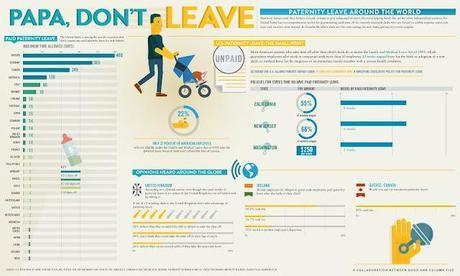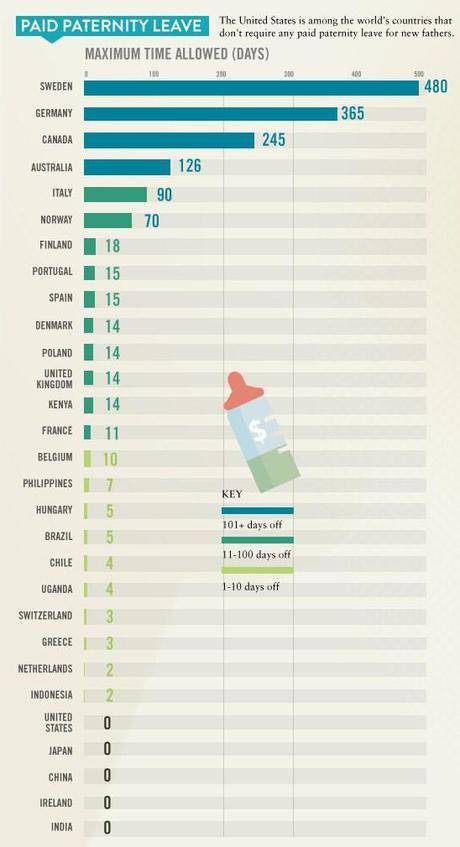PM Lee made a surprise mention in his National Day Rally speech that it's time to look at paid paternity leave. Which of course thrilled me and made me do my silly dance in euphoria.
I mean, raising a child is a dual responsibility after all and many a time, new mums crave for an extra pair of hands in the house. A pair of hands that does not belong to the confinement lady, nanny or grandparent, but the man who played a part in bringing this child to the world. It's like, yes, we can get external help when we are on the verge of suffering a mental breakdown, but it's never the same as knowing that the father is around in the house to care for his newborn and to hold you up when you fall.
That's why he's the dad and that's why there's only ONE dad in the world, right?
It always tickles me when Singaporean ministers come to Sweden for a visit and marvel at how 'easily' and 'fast' we give birth here. They will say things like "It's great to know you are making so many babies", "Singapore has a low fertility rate of close to 1, I think you all have over 3", "You must tell us the baby formula and that would solve our problem" and so on.
In a sense, it's true. I might still be stuck in the rat race trying to climb to the top of the corporate ladder if I did not leave Singapore. Which means I might not have even given birth to my first child yet. *horrified at the thought* Coming to Sweden and giving up all I had back home meant that I had a brand new start in life. Work-less.
In a country that's as pro-family as Sweden, it's no wonder making a baby seemed the norm to do when you are a no-income-can't speak-Swedish-nothing-else-to-do housewife.
For those who don't know it yet, SWEDEN HAS THE BEST PAID PATERNITY LEAVE in the world.
Just how much?
Sweden was the first country in the world to introduce parental leave in 1974 and that leave is gender-neutral, meaning for both the mom and dad. Believe it or not, here in Sweden, parents are allocated a total of 16 months per child. Yes, that makes 480 days. Tha parents can share these days, however 60 days are allocated specifically for the father. They are entitled to receive 80% of their wages in this period which is capped at a ceiling, followed by a flat rate. In addition, the 480 days can be distributed until the child turns 8 or finishes first year of schooling, which ever occurs latest.
The hubby was telling me today that he has a Swedish colleague who has a total of 6 children. Yes, 6! Which is why he has accumulated so much paternity leave that he's always taking time off to be with his family. In a report done by NPR which states that Sweden is the most generous in parental leave, dads seem happy here because the law has really helped them bond with their kids.
Comparing across continents, Europe definitely has one of the best parental leave policies in the world.
Norway offers parental leave that can total 56 weeks. 9 weeks are exclusively reserved for the mother and 10 weeks are exclusively reserved for the father. They may divide the rest as they choose.
In Iceland, the overall length of the combined maternity/paternity leave is 9 months, divided into thirds. 3 months are reserved for the mother, 3 months for the father, and the parents can divide the remaining 3 months between them.
To read more on parental leave in the world, go here.
On the contrary, if you look at the United States, it doesn't require employers to give new fathers a single day of paternity leave, even though some states do implement otherwise.


So thinking about it, our government is at least kind enough to provide 2 days of paid paternity leave.
However, is that adequate and does that scream pro-family? My view is definitely not.
I get it that while employees are calling for better work-life balance, employers are now voicing out their concerns over the possible consequences of increased paternity leave. They view that Singapore is not ready for the change and quote reasons like labor shortages, difficulty to replace highly skilled workers and disruption to the workplace.
In the first place, every pregnancy takes nine months to process and we only see the final product after that. Doesn't that give companies ample time to plan ahead and make adjustments? It's not like all men in the company will become dads at the same time in the same year. Every father, no matter rank, income or status, should be entitled to his well-deserved paternity leave.
If we keep thinking that we are not ready, then we will never be ready.
We know that our fertility rate is at a low 1.2 in 2011, a far cry from the replacement rate of 2.1. The Malay community had a rate of 1.64, Indian 1.09 while Chinese scored the worst at 1.08. Why am I not surprised? We've been warned that we must increase its total fertility rate by 2015, or the country's labor force will shrink to the point that it becomes a challenge to support the growing aging population.
Yet when we attempt to take a step forward and introduce better paternity leave, employers are apprehensive of the changes it will bring about, employees are worried that taking too much leave will affect their work performance, appraisal and subsequently bonus, and the society at large is divided on the issue.
If you ask me, I will definitely agree that Singapore appears to be too pro-work and not pro-family enough. The thing is, it's impossible to tilt the beam at one go, it's going to have to be a slow and gradual change. But in order to make the change happen, we must first be willing to go the right direction and subsequently take steps to maintain it, some smaller steps and some bigger ones. Until we reach the desired equilibrium.
For every decision we make, there's bound to be spillover effects and it's a matter of how we acclimatise, adapt, and accept. Work-life balance isn't something that the government can make happen. It's the mindset of the people that has to change first.
Well, if work and family are really two worlds and we can never have the best of both, I'm just glad I chose the latter.
P/S: To the full-time working couples who still manage to juggle a happy family life in Singapore, especially those above the average fertility rate and have more than one kid, I salute you.
******
Linking up with
However, is that adequate and does that scream pro-family? My view is definitely not.
I get it that while employees are calling for better work-life balance, employers are now voicing out their concerns over the possible consequences of increased paternity leave. They view that Singapore is not ready for the change and quote reasons like labor shortages, difficulty to replace highly skilled workers and disruption to the workplace.
In the first place, every pregnancy takes nine months to process and we only see the final product after that. Doesn't that give companies ample time to plan ahead and make adjustments? It's not like all men in the company will become dads at the same time in the same year. Every father, no matter rank, income or status, should be entitled to his well-deserved paternity leave.
If we keep thinking that we are not ready, then we will never be ready.
We know that our fertility rate is at a low 1.2 in 2011, a far cry from the replacement rate of 2.1. The Malay community had a rate of 1.64, Indian 1.09 while Chinese scored the worst at 1.08. Why am I not surprised? We've been warned that we must increase its total fertility rate by 2015, or the country's labor force will shrink to the point that it becomes a challenge to support the growing aging population.
Yet when we attempt to take a step forward and introduce better paternity leave, employers are apprehensive of the changes it will bring about, employees are worried that taking too much leave will affect their work performance, appraisal and subsequently bonus, and the society at large is divided on the issue.
If you ask me, I will definitely agree that Singapore appears to be too pro-work and not pro-family enough. The thing is, it's impossible to tilt the beam at one go, it's going to have to be a slow and gradual change. But in order to make the change happen, we must first be willing to go the right direction and subsequently take steps to maintain it, some smaller steps and some bigger ones. Until we reach the desired equilibrium.
For every decision we make, there's bound to be spillover effects and it's a matter of how we acclimatise, adapt, and accept. Work-life balance isn't something that the government can make happen. It's the mindset of the people that has to change first.
Well, if work and family are really two worlds and we can never have the best of both, I'm just glad I chose the latter.
P/S: To the full-time working couples who still manage to juggle a happy family life in Singapore, especially those above the average fertility rate and have more than one kid, I salute you.
******
Linking up with


